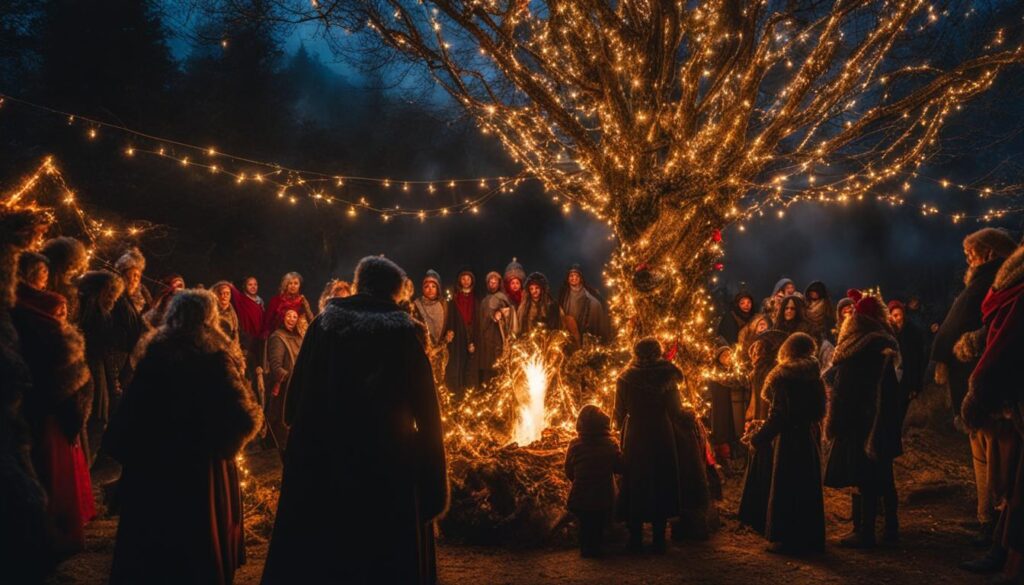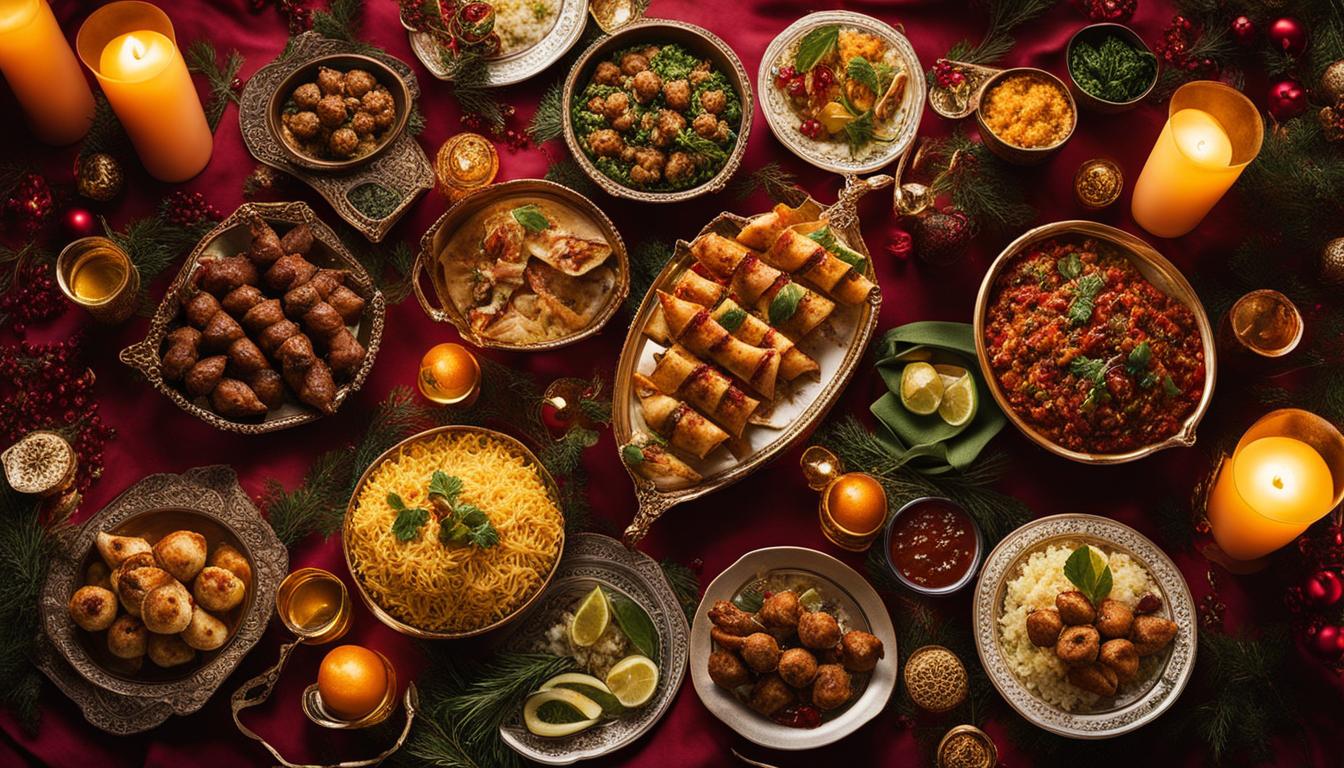Christmas is not a Muslim holiday, and Muslim countries do not celebrate it. However, in situations where Muslims and Christians coexist, there are ways for Muslims to react and support their Christian neighbors during the holiday season. It is important to remember that the Prophet Muhammad emphasized the protection of religious freedom and allowed a Christian delegation to celebrate their religious services in the Mosque of the Prophet. Muslims can extend holiday breaks to Christian employees, ensure the safety of Christian minority communities, and show support for Christians in places where they face persecution. Historically, Muslims have strived to protect the rights of non-Muslims in their midst, including Christian communities. Muslims can respect and honor Jesus as a prophet while maintaining their own religious beliefs and practices.
Key Takeaways:
- Muslims do not celebrate Christmas, but they can support their Christian neighbors during the holiday season.
- The Prophet Muhammad emphasized the protection of religious freedom and allowed Christians to celebrate their religious services in the Mosque of the Prophet.
- Muslims can extend holiday breaks to Christian employees, ensure the safety of Christian minority communities, and show support for Christians facing persecution.
- Historically, Muslims have protected the rights of non-Muslims in their midst, including Christian communities.
- Muslims can respect and honor Jesus as a prophet while maintaining their own religious beliefs and practices.
The Significance of Jesus in Islam
While Muslims do not celebrate Christmas, they hold Jesus in high regard as one of the great prophets of Islam. The Quran mentions Jesus 25 times and his mother, Hazrat Maryam (Mary), 34 times. Muslims believe in the miraculous birth of Jesus and the special place he holds in the Abrahamic tradition. However, Muslims do not celebrate the birthdays of any prophets, including Jesus. The focus is on following the teachings of the prophets and living a life in accordance with those teachings. Celebrating a prophet’s birth could lead to the adoption of beliefs and practices that may not align with Islamic teachings.
It is important to note that while Muslims believe in the significance of Jesus, their understanding of his role differs from that of Christians. Muslims believe that Jesus was a prophet, not the son of God. They revere him as a messenger who brought divine guidance to humanity but do not attribute divinity to him. This fundamental distinction in belief shapes Muslim attitudes towards celebrating Jesus’ birth or participating in Christmas traditions.
H3: The Role of Jesus in Islamic Beliefs
- Jesus is regarded as one of the five greatest prophets in Islam, along with Noah, Abraham, Moses, and Muhammad.
- Muslims believe that Jesus performed miracles, such as healing the sick and raising the dead, through the power of God.
- Islam teaches that Jesus will return to earth in the future as a just ruler, bringing peace and justice to the world.
Overall, the significance of Jesus in Islam lies in his prophethood and the profound impact of his teachings on Muslims’ understanding of faith and spirituality. While Muslims do not celebrate Christmas, their respect for Jesus serves as a bridge between Islam and Christianity, fostering interfaith dialogue and understanding.
The Timing of Jesus’ Birth in Islamic Beliefs
In Islamic beliefs, the exact timing of Jesus’ birth is not explicitly mentioned in the Quran or the Bible. However, both texts provide clues and descriptions that can help determine the season in which Jesus was born. According to the Quran, Jesus’ birth occurred during the season of ripening dates, which is typically in late summer or early autumn. This aligns with the biblical account of shepherds tending to their sheep in open fields, which would not be common during the cold winter months.
The choice of December 25 as the date for Christmas is believed to have pagan origins and is not based on historical or biblical evidence. Therefore, it does not correspond with the Islamic view of Jesus’ birth. Muslims focus on following the teachings of the prophets and living a life in accordance with those teachings rather than celebrating their birthdays.

By understanding the timing of Jesus’ birth in Islamic beliefs, Muslims can maintain their faith and adhere to their religious practices. It is important to note that the emphasis in Islam is on the teachings and message of the prophets, rather than specific dates or celebrations.
The Avoidance of Shirk and Pagan Traditions
When it comes to Christmas, Muslims have a distinct perspective rooted in the core principles of their faith. Islam strongly rejects the concept of shirk, which is associating partners with God or attributing divine qualities to anyone or anything besides God. The belief that Jesus is the son of God, a central tenet of Christianity, goes against the Islamic understanding of monotheism.
In addition to the theological differences, many Christmas traditions have pagan origins, which further contribute to the divergence between Islamic beliefs and Christmas customs. Practices such as decorating Christmas trees and the figure of Santa Claus have their roots in pre-Christian European pagan traditions. Muslims are discouraged from participating in such rituals as they do not align with Islamic teachings.
The Islamic View on Christmas Traditions
- Christmas trees: Muslims avoid decorating Christmas trees as it is seen as imitating non-Muslim practices with pagan origins.
- Santa Claus: Muslims do not promote the belief in Santa Claus as it entails attributing divine-like qualities to a fictional figure.
- Gift-giving: While Muslims value generosity and kindness, gift-giving during Christmas is not part of Islamic traditions, as it is associated with the celebration of Jesus’ birth.
- Christmas carols: Muslims do not engage in singing or performing Christmas carols as they are centered around the celebration of Jesus’ birth.
In summary, Muslims do not celebrate Christmas due to their commitment to the oneness of God and the avoidance of shirk, as well as the pagan origins of many Christmas traditions. By staying true to their religious beliefs, Muslims uphold the principles of Islam and maintain their distinct cultural and religious practices.

The Importance of Educating About Islam
Education about Islam plays a vital role in the preservation of Muslim identity and the understanding of why Muslims do not celebrate Christmas. By deepening their knowledge of Islam, Muslims can uphold their religious beliefs and practices while navigating the influence of other cultures and religions.
Teaching Islam to new generations is crucial in ensuring the continuity of Islamic traditions and values. Muslim parents and communities should emphasize the teachings of Islam and instill a strong sense of faith in their children. By educating young Muslims about their religious heritage, they can make informed decisions about their participation in non-Islamic traditions.
Preserving Muslim identity involves instilling a deep understanding of Islamic teachings, values, and practices. This education allows Muslims to differentiate between their own religious customs and those of other faiths. By maintaining a strong connection to their faith, Muslims can confidently navigate the multicultural landscape without compromising their religious beliefs.
The Role of Islamic Education
Islamic education should include learning about the teachings of Prophet Muhammad and the stories of the prophets, including Prophet Jesus. By understanding the unique perspective of Islam on Jesus, Muslims can appreciate his role as a revered prophet without adopting beliefs that do not align with their faith.
Promoting Interfaith Dialogue
Education about Islam also encourages Muslims to engage in respectful interfaith dialogue with people of other religions, including Christians. By actively seeking to understand and respect the beliefs and practices of others, Muslims can contribute to promoting interfaith harmony and mutual respect. This dialogue allows for the exchange of ideas and the fostering of peaceful coexistence.
Promoting Interfaith Harmony
While Muslims do not celebrate Christmas, they can still play a vital role in fostering interfaith harmony and building positive relationships with their Christian neighbors and friends. By engaging in respectful dialogue and seeking to understand the beliefs and practices of others, Muslims can contribute to a society where diverse religious communities are respected and supported.
Interfaith Dialogue
One way Muslims can promote interfaith harmony is by participating in interfaith dialogue. This involves open and honest conversations between individuals from different religious backgrounds, where each side can share their perspectives, beliefs, and values. By engaging in meaningful dialogue, Muslims can help dispel misunderstandings and build bridges of understanding and respect.
Respecting Other Religions
Respecting other religions is another important aspect of promoting interfaith harmony. Muslims can show respect for Christianity and its celebrations, including Christmas, by acknowledging their Christian neighbors’ traditions and offering well-wishes during the holiday season. Respectful gestures such as attending interfaith events, visiting churches, or extending invitations for interfaith gatherings can help foster mutual understanding and friendship.
- Attending Interfaith Events: Muslims can participate in interfaith events organized by their Christian neighbors or local community organizations. These events provide opportunities to learn about different religious traditions and foster connections with people of diverse backgrounds.
- Visiting Churches: Muslims can pay visits to churches during festive times like Christmas to express solidarity and learn more about Christian practices. This gesture demonstrates respect and a willingness to understand and appreciate the beliefs and traditions of others.
- Extending Invitations: Muslims can extend invitations to their Christian neighbors and friends to join in Muslim festivities and celebrations, showcasing the spirit of inclusivity and fostering mutual respect.
By actively promoting interfaith harmony and respecting other religions, Muslims can contribute to a society where diversity is embraced, and religious communities can coexist peacefully.
The Importance of Celebrating Muslim Festivals
While Muslims do not celebrate Christmas, they have their own vibrant festivals and holidays that hold great significance in their religious and cultural traditions. These festivals provide an opportunity for Muslims to come together, express gratitude, strengthen family bonds, and engage in acts of charity.
Eid-ul-Fitr
One of the most widely celebrated Muslim festivals is Eid-ul-Fitr, which marks the end of the holy month of Ramadan. This festival is a time of joy and thanksgiving, as Muslims break their fast and indulge in delicious feasts with family and friends. It is also a time for giving, as Muslims are encouraged to donate to those in need to ensure that everyone can participate in the festivities.
Eid-ul-Adha
Another significant festival is Eid-ul-Adha, which commemorates the willingness of Ibrahim (Abraham) to sacrifice his son as an act of obedience to God. Muslims celebrate this festival by offering prayers, sacrificing animals, and distributing the meat to the less fortunate. It is a time for reflection, gratitude, and acts of kindness towards others.
By celebrating these festivals, Muslims are able to rejoice in their faith, share blessings with others, and strengthen their connection to God and their community. These festivals provide a sense of identity, unity, and spiritual fulfillment, reminding Muslims of the values and teachings that are fundamental to their belief system.
Conclusion
In conclusion, Muslims do not celebrate Christmas as it is not a Muslim holiday and goes against Islamic beliefs and practices. While Muslims hold Jesus in high regard as a prophet, celebrating his birthday or participating in Christmas traditions would contradict their monotheistic faith and Islamic teachings.
Muslims can instead promote interfaith harmony, respect other religions, and focus on celebrating their own festivals and holidays. By staying true to their Islamic identity and educating themselves and future generations about their faith, Muslims can navigate cultural influences while maintaining their religious practices.
Therefore, Muslims can show support for their Christian neighbors during the holiday season by extending holiday breaks to Christian employees, ensuring the safety of Christian minority communities, and demonstrating solidarity in places where Christians face persecution. By following the teachings of Prophet Muhammad, Muslims can respect and honor Jesus as a prophet while upholding their own religious beliefs and practices.
FAQ
Do Muslims celebrate Christmas?
No, Muslims do not celebrate Christmas as it is not a Muslim holiday.
How do Muslims view Jesus?
Muslims hold Jesus in high regard as one of the great prophets of Islam.
Why don’t Muslims celebrate the birthdays of prophets?
Muslims focus on following the teachings of the prophets rather than celebrating their birthdays.
What is the significance of Jesus’ birth in Islamic beliefs?
The Quran mentions Jesus’ birth and Muslims believe in his miraculous birth.
Why do Muslims avoid participating in Christmas traditions?
Islam rejects associating partners with God and participating in pagan rituals.
How can Muslims educate themselves about Islam?
Muslims can deeply study and understand Islam to preserve their religious identity.
How can Muslims promote interfaith harmony?
Muslims can engage in respectful dialogue, seek to understand others’ beliefs, and share their own beliefs.
What are the festivals celebrated by Muslims?
Muslims celebrate festivals like Eid-ul-Fitr and Eid-ul-Adha.

